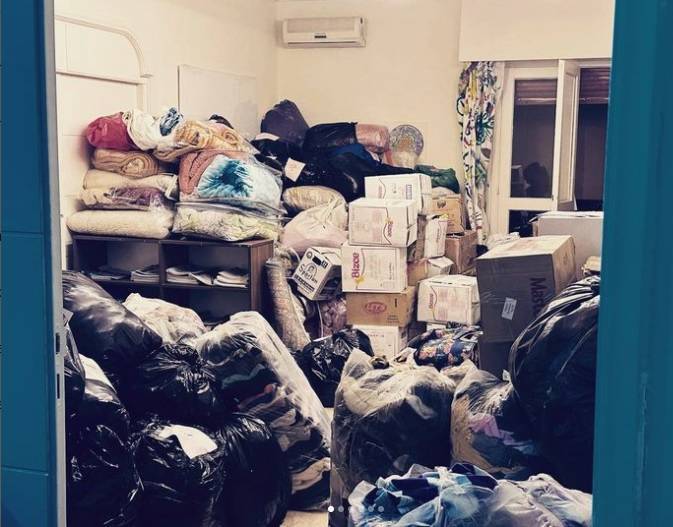
Aid collected in Beirut by the Shabakat collective, ready to be sent to Syria. (Photo courtesy of Shabakat team)
“Please don't send any more clothes. We especially need infant milk,” said *Rami, a Beirut-based member of the charity Syrian Eyes.
The young man, who asked to conceal his identity for fear of being targeted by the Syrian government, collects donations for earthquake victims.
Formed in 2013, the Syrian Eyes team is made up of 20 Syrian and Lebanese volunteers based in Beirut and Europe. It is among the many citizen initiatives that launched fundraising campaigns for those affected by the quake.
“There is a huge need for infant milk, and we are trying to find as much as we can. But unfortunately, this product is also lacking in Lebanon,” said Rami.
Donations poured in from all over Lebanon, and the first batches of aid sent consisted of mostly winter clothes.
"In addition to baby milk, priority is now given to medicines, especially those for chronic diseases such as diabetes or hypertension, but also batteries, flashlights, first aid kits and hygiene products such as diapers for babies or adult and sanitary towels," said Rami.
Higher Relief Committee head Mohammad Kheir said the majority of donations came from Lebanese citizens.
"These are mostly initiatives of civil society that pass through the border,” he told L’Orient-Le Jour.
Idlib remains inaccessible
Syria Eyes is currently accepting cash and in-kind donations at various Lebanese organizations and businesses it has partnered with. These include Nation Station, Great Oven, and the Emergency Room.
Lebanese non-profits Nation Station and Great Oven have organized a charity dinner for Thursday, 8 p.m. at Great Oven's location in Mar Mikhael.
Charity initiatives carried out by civil society organizations like Syrian Eyes remain under the watchful eye of the Syrian embassy in Lebanon which grants permits for convoys wishing to cross the Masnaa border post in the Bekaa into Syrian territory.
The Syrian embassy requests details on the transported products, vehicles, and drivers that cross the border— measures that delay the departure of aid.
Kheir, on the other hand, assured L’Orient-Le Jour that "there are no complications in getting the aid through [the border].”
"If you know of any problems, contact us," he added.
Most of the quake-relief aid sent from Lebanon goes to Latakia on the western coast and to Aleppo in the northwest.
Idlib in northwest Syria suffered significant damage in the earthquake but remains inaccessible to donations from Lebanon. The region is in rebel-held territory, outside of regime control.
"It is impossible to reach Idlib from Lebanon. The aid that is sent there comes from Turkey," explained Hussein Kazoun, founder of Nation Station.
"We don't have the means to go to Idlib," said Ahmad, a volunteer from Shabakat, a group of Lebanese, Syrian, and Palestinian volunteers based in Beirut.
Born in the aftermath of the earthquake, Shabakat sent a donation of clothes to Aleppo and Latakia through a Syrian NGO last Saturday. The group is preparing a second convoy to help disaster victims in Hama.
"Syrian associations were left with a surplus of clothes. Now the priority is medicines, diapers, baby milk, tents, and cash to fund housing rentals," said Lama, a Shabakat volunteer.
"Those who have lost their homes are sleeping in the street. They don't have access to bathrooms, they need to shower, sleep under a roof, and feel safe," she added.
"We are collecting clothes, medicines and food, which we hope to send to Syria through the Lebanese Civil Defense, which is coordinating with the Syrian authorities," Georges Bitar, founder of NGO Live Love Recycle told L’Orient-Le Jour.
"We have been through similar situations, we know what it's like," added Bitar.
Order of Physicians
The Lebanese Order of Physicians sent medical equipment to Syria on Tuesday.
"Syrian hospitals need all kinds of equipment, from scanners to needles and compresses," said Youssef Bakhache, president of the Lebanese Order of Physicians.
According to Bakhache, equipment was donated by various Beirut university hospitals and is expected to reach hospitals in Latakia, Aleppo and Tartus.
"A second shipment could be made if other hospitals again offer medical equipment for Syria," he added.
A second Lebanese medical mission is expected to travel to Syria to carry out reconstructive operations and microsurguries, said Bakhache.
Hezbollah and the Lebanese Ba'ath send aid to Syria
Last Sunday, Hezbollah official Hashem Safieddine announced that the party sent a dozen trucks loaded with aid to Latakia on the Syria's west coast.
According to Safieddine, additional convoys will soon be sent to Aleppo.
In the Bekaa, the Lebanese branch of the Ba’ath Party — sister organization of the Syrian Ba’ath Party that has controlled Syria since 1970 – sent aid to the country on Monday, according to L’Orient-Le Jour’s correspondent in the region.
The party reportedly sent medical aid and food through a convoy of about 100 vehicles traveling from Baalbeck to Latakia.
*Names have been changed for security reasons. Reporting contributed by Sarah Abdallah. This article was originally published in French on L'Orient Le-Jour. Translation by Sahar Ghoussoub.